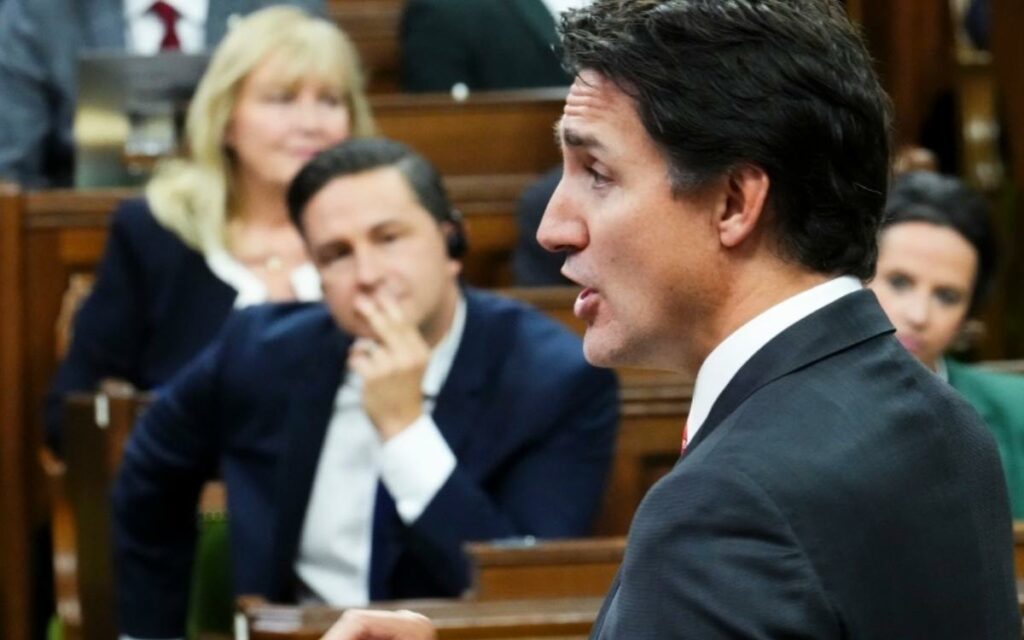
Parliament returned last week, with the affordability crisis taking centre stage. Photo credit: The Canadian Press/Sean Kilpatrick
The boys and girls are back in town, and they’re ready to rumble.
Last week marked the return of Parliament, with politicians from across Canada back in Ottawa. Though the city’s mornings are colder and the ground is now covered in frost, the temperature inside the House of Commons remains as hot as it was before the summer break.
Last week, Justin Trudeau strolled into Question Period with a new cabinet and the hopes of turning the page on a disastrous summer. If you believe the polls, he and his government are in hot water. While on the other side of the aisle, Pierre Poilievre and his Conservatives were ready to go and came out swinging.
Words were said, comments were made, but the government did not seem phased by the attacks from the opposition parties. However, their response did sound different, and one of a tired government who is starting to see the writing on the wall. Even the Prime Minister has seemed to have lost the pep in his step in recent months, but he has assured his caucus and Canadians that he is not going anywhere and will remain Prime Minister for the foreseeable future.
With Trudeau locked in and the whispers of him leaving becoming a hushed tone, the government set out their top priority for the upcoming session: affordability. The first stop on the affordability train was at the base of Maslow’s hierarchy of needs – food and shelter. If a person’s monthly budget is any indicator of this problem, the government has a long way to go to tackling it.
Last Monday, the government called upon the CEOs of Metro, Sobeys, Costco, and Walmart to meet with the Minister of Innovation, Science and Economic Development to discuss their skyrocketing profits and how they can make life more affordable for Canadians. In the meeting, the government threatened new tax measures and other penalties if the grocery giants do not stabilize prices by Thanksgiving.
To show the CEOs that they mean business, the government introduced legislation that would amend the Competition Act to allow the Competition Bureau to compel information from grocery companies, prevent large grocers from monopolizing the industry and restrict mergers between companies. This appears to be the government’s first step in tackling the affordability crisis that many Canadians find themselves in.
The legislation also introduces measures that would remove the cost of GST from the construction of rental properties, which is the other challenge many Canadians are facing: affordable housing. In addition, the government is looking at giving more access to municipalities to the Housing Accelerator Fund, providing cash to cities committed to building more housing.
At the same time that the government was introducing their affordability measures, the Conservatives tabled a Private Member’s Bill that outlined their plan to address the national housing crisis. Though the bill is unlikely to pass, it centres around using federal infrastructure and transit spending to push cities to build more homes. It would require cities to increase home building by 15 per cent each year to receive their usual infrastructure spending. Cities that fail to meet this target would see a decrease in the federal dollars they receive and those that exceed the target would receive additional money.
Although it has only been a week, it is clear that the new buzzword in Ottawa is affordability. The government has taken note that if they would like to remain in power, action needs to be taken so Canadians can afford the basics again – like food and housing. For the Conservatives, they will spend the next few months like a dog with a bone and believe their ticket to the big leagues is to continue to hammer the government on this newfound buzzword of affordability.
No one can predict the future, but it is clear that whoever can fix this affordability crisis in Canada, they will be the ones to win the next election.

Daniel Perry is a consultant with Summa Strategies Canada, one of the country’s leading public affairs firms. During the most recent federal election, he was a regular panelist on CBC’s Power and Politics and CTV Morning Ottawa.


















